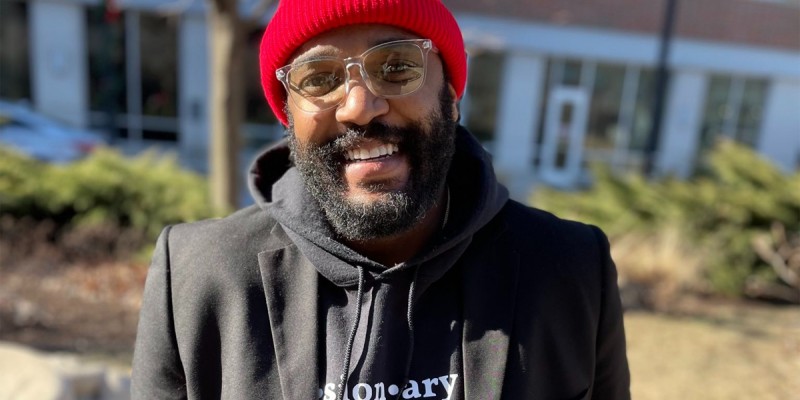When pressing play on an episode of the BlackVest Money podcast, you’re hit with two things straightaway. The first is a lo-fi beat thrumming a comfort jam, underlaying the second, the raspy, heartfelt voice of DeShawn “Wolf” Williams. In his podcast, a continuation of the BlackVest Money endeavor he founded, Williams relays in a comforting style how he has dealt and is dealing with financial culture, both personally and philosophically. He embraces, at the core of it all, a reoccurring theme of transparency.
Williams joined me over Zoom to discuss BlackVest Money and its meaning to both him and the Champaign-Urbana region.

Image provided by BlackVest Money.
Smile Politely: Before we dive into BlackVest, tell me about your logo. The design is an angular, sharp crest that seems almost like a shield.
DeShawn Williams: My good friend Cameron Raab actually created the logo. You have the obvious black vest that reflects the corporate world, but within that is the diamond. The “diamond in the rough” idea is my thinking with BlackVest itself. The processes we go through, with all the pressure and hardship of what it takes to make that diamond, and in the end, you get a beautiful shining situation that we all love and spend a lot of money on. Prior to where we are today, in all honesty, my family went through hell and back in regards to our financial situation. We had to learn a lot of lessons through our mistakes, and I want BlackVest to help people avoid having to go through what we went through to learn those lessons.
SP: Lay out what BlackVest offers the Champaign-Urbana community.
Williams: BlackVest at its core is financial literacy. Everyday decision-making, basic information that you won’t necessarily think to search for online. From creating budgets, payment schedules, things of that nature — small things that are often simple, but we sometimes need someone to help remove the blinders to see the processes of financial literacy. We provide that information to individuals who may not have access to it for one reason or another.
SP: In listening to your podcast and getting to know you from what’s out there in the world, it seems like the concept that you keep coming back to is one of transparency.
Williams: More often than not we see so-called financial gurus online who claim they’ve never made mistakes and will show you the way, but with us, transparency is key. In a couple of my podcast episodes, I mention when I was applying for a promotion at a previous job, the company president had my credit report laid out on his desk. That’s a true story. At that time, my credit was not in the best shape at all, so for me, the creation of BlackVest and emphasis on transparency — I know that I wasn’t the only one, and there are others today that are in that exact same scenario: Afraid to apply for a promotion or a new job because they don’t want to have their credit pulled, or afraid to try and buy a new car because of bad credit scores, and so on. BlackVest is about assuring those people that I’ve been there. I wasn’t always where I am today. My wife and I got married in 2013, and before that I was in a great financial position. After marriage and having a son, I left the company I was with. My income went here [gesturing low on his chest] but my bills stayed up here [gesturing to his brow]. Early in our marriage it felt like we had eviction notices on our door every month. So yes, I had money and a great situation, but life happened and we tanked. So, I want to be transparent with people, showing them how to climb back up. Just because you fall victim to whatever circumstances, such as this pandemic, the you of today does not need to be the you of the future.
SP: I related to one of things you discussed on your BlackVest Money podcast, about the tiny fears of not wanting to check the bank balance, look at the credit card bills, etc., while simultaneously eating out and spending needlessly quite a bit, and in your mind sort of pretending those purchases aren’t adding up. Tell me about how you confronted and conquered those feelings.
Williams: When I would perform — I love to sing, it’s a hobby of mine — I would find myself spending all this money on clothes, jewelry, things of that nature, so I could appear to be one way, but in reality, at that time we were financially crumbling. I remember having an epiphany at that time where I realized that I’m spending all this money to impress people that genuinely don’t care. Ultimately, I go home to my wife and my son, at the time [Williams now has two children], and those are the individuals that mattered. It took me awhile to get to a new mindset to where if somebody does want to go out to eat, for example, that unless it’s important, we can keep it moving. Getting to that headspace where I realized that I don’t have to “keep up with the Joneses” — nobody’s even met the Joneses! [laughter] — that was a turning point for us.
SP: How does BlackVest begin to initiate change when it comes to working with a new client?
Williams: The initial meeting — I call it a “cookie-cutter,” — in a sense, is where I give people a week-by-week schedule over a two-week span. On that schedule it has different categories. I tell people to not change anything about their spending habits for two weeks. The only thing I want them to do is write everything down. Don’t consciously think about the sheet during this period; don’t omit a Culver’s purchase just because you feel guilty. Just go about your day normally, doing exactly what you’d normally do, just document it all. By the end, you can total up the amount spent on stupid purchases and see just how much you could have saved. Put it on paper. It’s right in front of you, and you see how much you spent. How much of that could’ve gone toward bills, a credit card payment? So often it’s not about having enough money; it’s that we’ve not learned how to deal with the money that we have.
SP: BlackVest is available to the entire Champaign-Urbana area, but talk to me about how it speaks to the people of color here in Champaign County, creating more minority-owned businesses and promoting and cultivating Black and Brown entrepreneurs here in Champaign-Urbana?
Williams: The elephant in the room — especially in regards to finance — more often than not in the Black and Brown community [is that] there is a lack of knowledge. You’re not going to find as many people that have received generational wealth or inheritance. BlackVest absolutely is about empowerment, providing that information that Black and Brown people may not normally have access to for one reason or another. It’s definitely something BlackVest is very conscious of.
SP: How can people contact BlackVest?
Williams: Text us! 217-418-2354. That is the quickest way, and we will follow up and work with you on meeting your goals.
We’re also on Instagram and Facebook at BlackVest Money.








